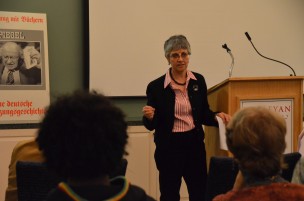German Studies Professor Winston talks about Günther Grass's “Too Far Afield” to conclude the Department's Fall Lecture series.
Professor of German Studies Krishna Winston discussed Günter Grass’ novel “Too Far Afield,” which she is currently translating, in a lecture titled “The Wallpeckers” on Thursday, Nov. 6. The lecture marked the conclusion of a four-part lecture series sponsored by the German Department and the German Embassy in Washington, D.C.
Adjunct Associate Professor of German Studies Iris Bork-Goldfield, who coordinated the event, explained why Winston was chosen.
“I had requested a grant from the German government for this series and proposed that we would have four events,” Bork-Goldfield said. “The first one was on the historical background, then the political background, then the practical implications—we had a reporter who was a Wes grad come—and for the last one, we wanted to have someone within the department.”
Bork-Goldfield hopes that these lectures have illuminated both the richness of the University’s German Studies Department and the usefulness of a German major in the world outside of the University.
“We hope that events like this make us more visible on campus and spark interest in German studies,” Bork-Goldfield said. “The events that we’ve had show how interdisciplinary the German Studies Department is…. Our enrollment is steady, but of course we would like to have more majors.”
Bork-Goldfield introduced Winston as Dean of the Arts and Humanities, Marcus L. Taft Professor of German Language and Literature, and Professor of Environmental Studies at the University. Winston, who has translated more than 35 books, specializes in the works of German authors Günter Grass and Peter Handke.
Pulitzer Prize-winning author Grass is best known for his novel “The Tin Drum,” which received high literary praise in Europe and the United States when it was originally translated from German in 1961. His novels have received varying levels of critical reception in the United States and abroad.
Winston spoke about the sometimes incendiary nature of Grass’ work.
“He was born in 1927, so [Grass] has managed to live a long time,” Winston said. “His recent essay, titled ‘What Must Be Said’ and written about the Israeli-Palestinian conflict, caused an outcry. He does that on purpose, but what he’s really doing is trying to get people to think, to not fall for platitudes, and to not settle for public correctness.”
Winston explained that when Grass was 17, he served briefly in the Waffen-SS, which was a last-ditch Nazi effort to draft both older and younger male soldiers at the end of World War II. Grass served for several weeks and then was taken to an American prisoners-of-war camp. Grass revealed this crucial fact about his past in 2006 in the first volume of his memoir, “Peeling the Onion.”
In her lecture, Winston emphasized the importance of the work’s title.
“I think that Grass’ entire literary work is dedicated to confession and to urging his fellow countrymen to be honest with themselves about their political past,” Winston said. “In ‘Peeling the Onion,’ he is peeling away his own layers of skin and being very critical about himself, his fellow countrymen, and the history of the German people.”
Before reading aloud from her translation, Winston summarized the plot of “Too Far Afield,” which was translated in 2000 and originally published as “Ein Weites Feld” in 1995. The book is a direct reaction to the fall of the Berlin Wall in 1989. The philosophical novel follows the protagonist, Theo Wuttke, who views himself as a reincarnation of prominent 19th-century German-language realist writer Theodor Fontane.
In the excerpts from the novel that Winston read aloud, Wuttke impresses archivists, who act as the “authors” of the novel, by acting and speaking exactly like Fontane. Convinced that Wuttke knows Fontane’s life and mannerisms better than they do, the archivists are unable to discern when Wuttke directly quotes Fontane or when he is merely speaking in the style of Fontane.
In her lecture, Winston explained to the audience why Grass chose Fontane as his inspiration.
“[Grass] loves Fontane, and his wife does, too,” Winston said. “He was looking for someone who played a role in cultural life in East Germany, who tied the contemporary story of Germany to its past, and who could represent the challenges, compromises, and the difficulties of someone in public life trying to live a decent life and being culturally represented, which are challenges that he [Grass] faces.”
Daniel Hurlbert ’15, a German Studies major, was pleased to attend the event and support the department.
“I enjoy supporting department events, and even when I don’t know much about the topic or have little interest in it, it’s always nice to see what your professors are interested in,” Hurlbert said.

Comments are closed